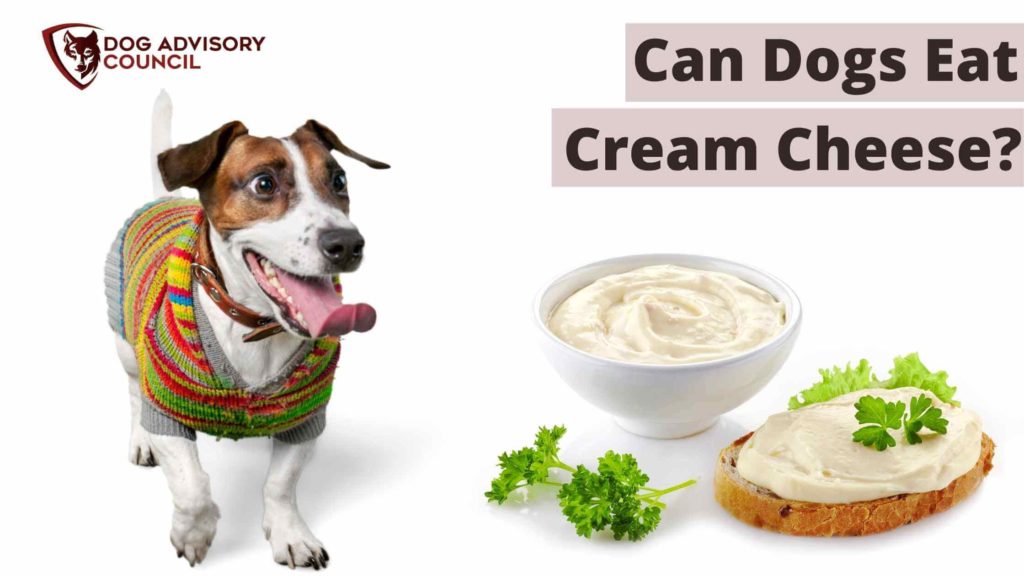
Imagine your dog begging for a little taste of your cream cheese spread afternoon snack. It is important for dog owners to research whether or not their dogs can eat cream cheese before feeding. So, can dogs eat cream cheese?
Yes, dogs can eat cream cheese, although consider the amount and the ingredients of the cheese you’re about to feed as well as if your dog is lactose intolerant or not.
Below, we’ll be talking about the right portion of cream cheese following its ingredients that are either beneficial or harmful for your dog.
Is Cream Cheese Poisonous to Dogs?
Dogs may appreciate the taste of cream cheese as much as you do, but they can only eat it to a certain extent.
If you’re tempted to share a finger-full of cream cheese with your dog, it’s completely fine, but be mindful that you can’t make it a daily treat.
Also, the majority of dogs can’t eat cream cheese, and, as unfortunate as it may seem, your pup is possible to be one of them.
Cream cheese is not poisonous to dogs, but it can be harmful to their health if not given moderation or contains added toxic ingredients.
The taste of cream cheese is mildly addictive that’ll keep your dog wanting more, but don’t give in!
Plenty of cream cheeses brands have a high content of fat, hence, frequent feeding to your dog can result in obesity and other issues connected to unhealthy weight.
Harmful ingredients in Cream Cheese
Despite cream cheese being non-toxic, it’s possible for it to have added ingredients that can be harmful to your furry friend.
If you want to give your dog a bit of a taste, make sure your cream cheese is free from the following ingredients:
Onions and garlic
Whether it’s homemade or bought, never feed your pet cream cheese with onions and garlic (or chives) in it, these ingredients fall under the allium family, which contains thiosulfate that can damage red blood cells and make your dog prone to getting hemolytic anemia.
Cayenne Pepper
Cream cheese mixed with extra spice tastes incredible, but it’s a big no for your dog.
If your cream cheese has cayenne pepper, it will irritate and cause a burning sensation in your dog’s mouth, throat, and tummy.
If fed with a full-spoon amount, your dog may experience vomiting or diarrhea too.
Cream cheese that doesn’t contain any of these ingredients is perfectly safe, but like what was aforementioned, cream cheese is usually high in calories and is fatty, so even though it’s not at all harmful, it’s not recommended for your dog to have either.
Are There Benefits if Dogs Eat Cream Cheese?
As a dog owner, it’s always a priority for you to look after your fur baby – ensuring not only a space for it to relax and enjoy but also providing it top quality and dog-friendly food.
You might feel discouraged about giving your dog cream cheese, but actually, a tiny bit of it won’t hurt!
Cream cheese has content that makes it a healthy delight for dogs, such as protein, calcium, essential fatty acids, and vitamin A and B complex vitamins.
If you feed your dog a small portion of cream cheese, you won’t have to worry about seeing any aftermath, just a trouble-free doggo ready to get its real meal later on.
Healthy Ingredients in Cream Cheese
Cream cheese may not be the best choice to consume by your dog, but it does have certain health benefits to consider.
Let’s take a quick check on the health contents of cream cheese listed below:
Protein
Although it’s good to note that cream cheese contains protein, truth be told, it only has a small percentage of it.
Thus, it won’t significantly affect your dog’s health at all, considering you only have to feed your dog a small amount too. Cream cheese would most likely serve your dog with a likable flavor more than anything else.
Calcium
Cream cheese won’t be cream cheese without its two major ingredients: cheese and milk, which are both excellent sources of calcium.
Despite it containing lesser calcium compared to other cheese because of its high water content, it’s yet to promote teeth and bone health for your dog.
Essential Fatty Acids
Since cream cheese is known to have low protein and high amounts of fat and calories, it’s not best advised to feed to dogs frequently.
Although, not all the fat we know is bad for dogs; cream cheese contains essential fatty acids that are actually needed to produce a stronger and healthier body system.
Vitamin A and B12
Cream cheese is an excellent source of Vitamin A and contributes a fair amount of Vitamin B12 too. It helps your dog in maintaining optimal health and turns fat intake into energy.
Your canine friend can enjoy cream cheese every once in a while, and benefit from these nutrients.

What Will Happen if a Dog Eats Cheese?
Most dogs love cheese because it has a rich and satisfying flavor, but plenty of dogs have lactose intolerance to cheese and may experience difficulty digesting it.
Symptoms such as vomiting, frequent flatulence, and diarrhea can occur after feeding your dog cheese, especially if fed excessively.
Be mindful that cheese and all types of dairy products are high in calories; thus, your dog is highly likely to become obese or become prone to digestive problems like pancreatitis without moderation.
Discontinue giving your dog cheese if it shows signs that its stomach is upset and ask for professional help right away.
How much Cream Cheese can a Dog Eat?
Dogs aren’t meant to eat cream cheese, but it’s totally fine to share a little bit once in a while. In general, cheese is safe for dogs to get a sample taste of, but too much of anything isn’t right, so how do we know how much is enough?
The maximum amount of cream cheese a dog can have is just about a spoonful; go way more than that, it’ll become a problem.
It’s advised not to let your dog get used to eating any human food too; well-portioned chunks or pellets of dog food are made intentionally to sustain their health and are more appropriate to give as treats and as daily meals.
How to Safely Feed Cream Cheese to my Dog?
Even if your dog isn’t lactose intolerant, it doesn’t automatically mean that it’s safe to eat all the cream cheese it wants.
Note that cream cheese is not as nutritious compared to other kinds of cheeses since it has very little calcium and protein, while high in fat.
To safely feed cream cheese to your dog, feeding a small amount isn’t enough. You should make sure that it doesn’t contain added ingredients that are toxic to dogs and that it’s still fresh – your cream cheese shouldn’t be moldy; taste spoiled or have that sour odor going on.
What Should I Give to my Dog Instead of Cream Cheese?
There are tons of food that can be used as an alternative to give your dog rather than cream cheese.
If you’re thinking of another type of cheese that would be an excellent substitute for cream cheese, cottage cheese is the answer! Unlike cream cheese, cottage cheese is high in protein and calcium; making it the better cheese to feed to your dog.
Other than that, you can consider giving your dog any of the tasteful treats listed below:
- Apples – contains dietary fiber and helps in freshening your dog’s breath
- Bananas – packed with potassium and can help cure a dog’s upset stomach
- Blueberries – low-calorie treats and would help boost your dog’s immune system
- Carrots – make good chew toys and help improve a dog’s dental health
- Celery – low in fat and is an excellent source for fiber; it also helps in freshening your dog’s breath
- Peanut butter – contains heart-healthy fats and vitamins that’ll keep your dog feeling full and active
What Kinds of Cheese Can Dogs Eat?
If cream cheese is not the best cheese out there for your dog, then what is? Low in fat cheese, such as cheddar, mozzarella, or soft goat cheese are good options.
But if you’re going for the best for your dog, cottage cheese is the one. Cottage cheese is low in fat and sodium compared to its other counterparts, hence, feeding your dog cottage cheese is less likely to have digestive problems and also lowers the risk of becoming obese.
Conclusion
Moderation is key when giving your dog cream cheese or just about any type of cheese.
Moreover, making sure that your dog isn’t lactose intolerant and that your cream cheese doesn’t contain any harmful ingredients is a prior necessity when feeding.
Every meal matters as it plays a vital role in a dog’s overall health. Always be mindful of your pup’s nutrition and limit it from eating foods that are too rich or fatty such as cream cheese.
Lastly, keep a watchful eye on your dog’s diet, make sure you give it an ample portion of meals, and refrain from giving excess treats throughout the day.
